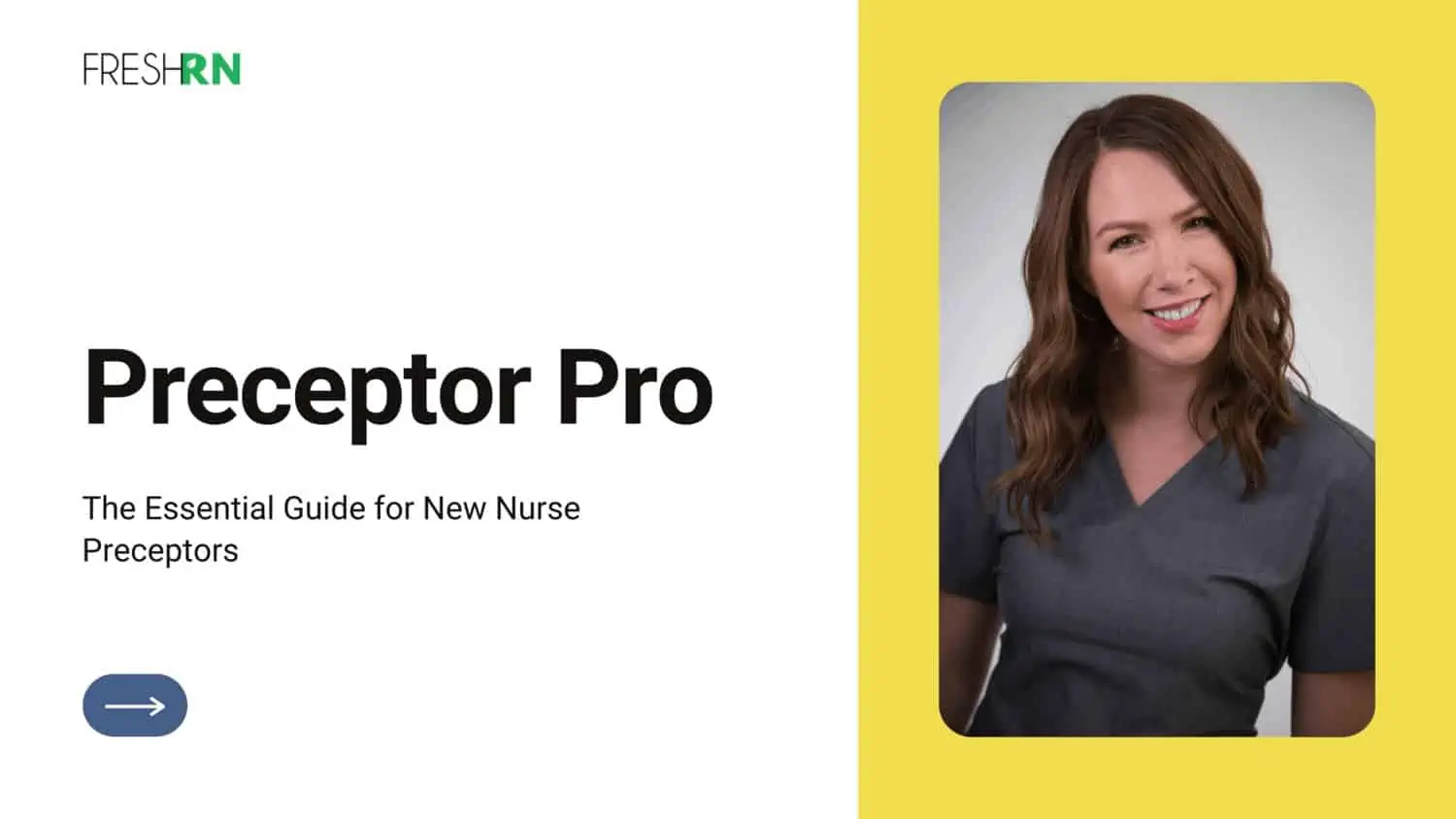Nursing is a profession that has seen rapid growth in recent years. This has led to a greater demand for staff nurses and more opportunities for those seeking to enter the nursing field. One of the best ways to gain experience and knowledge is through preceptorship and mentorship in nursing.
In this blog post, we will discuss the differences between preceptorship and mentorship and explain why both are important for nurses. Let’s dive in.
- Preceptorship and Mentorship in Nursing
- Who Are Mentor Nurses?
- Who Are Preceptors Nurses?
- You Want to Be a Great Preceptor?
- Types of Mentoring Processes and Strategies
- What are the Advantages of Being a Nurse Mentor?
- What are the Advantages of Being a Nurse Preceptor?
- Conclusion
- FAQs
- More Resources for Preceptorship and Mentorship in Nursing:
Preceptorship and Mentorship in Nursing
Who Are Mentor Nurses?
A mentor nurse is someone who helps you learn something new about nursing. Most mentors are experienced nurses that share what they know with students. Some universities have mentorship programs designed specifically to help students succeed after graduation. These programs provide structured mentoring experiences for undergraduate students during school.
A mentor in nursing can be an excellent resource for new nurses, there are several benefits of mentorship in nursing. They can provide support, guidance, and advice and help you develop your skills and knowledge. A good mentor will always share the knowledge that can help you navigate a nursing career. They can offer support for a period of time, share effective feedback on your work, and help you set goals and develop a career plan.
Responsibilities of the Mentor Nurse
The mentor nurse has several responsibilities, including:
- Providing guidance and support to new nurses in order to facilitate their professional development
- Offering clinical instruction and mentorship
- Acting as a resource for nursing staff regarding patient care, policies and procedures, and professional development opportunities
- Serving as a role model for nursing ethics and standards of practice for personal development
- Participating in staff meetings and other professional development activities to share their clinical experience
- Helping to orient new nurses to the unit with a supportive relationship
Key Characteristics of Effective Nurse Mentors
Here are a few key attributes that make for a great nurse mentor:
- Passionate about nursing and patient care – A great nurse mentor is passionate about nursing and insists on providing the best possible care for patients. They deeply understand the profession and are always willing to share their knowledge with others.
- Excellent communicator – An effective nurse mentor is an excellent verbal and written communicator. They can effectively convey their ideas and provide clear instructions when needed.
- Good listener – Besides being a good communicator, a good nurse mentor is also a good listener. They’re patient and take the time to listen to their mentee’s concerns and questions.
- Respectful – A respectful mentor-nurse relationship is built on trust, mutual respect, and a shared commitment to professional growth. A great mentor will always respect their mentee, even when they disagree.
- Supportive – A supportive mentor is always there for their mentee, offering encouragement and guidance when needed. They’re also willing to give constructive feedback that can help their mentee grow professionally.
- Flexible – A flexible mentor can adapt to their mentee’s changing needs. As the mentee’s needs change, so does the mentor’s approach to maintaining a professional relationship.
- Committed to professional development – A committed mentor is dedicated to their own professional development and always looking for ways to improve their skills. They’re also committed to helping their mentee grow professionally and reach their goals.
Who Are Preceptors Nurses?
A preceptor is a registered graduate nurse who has been designated by a nursing program to provide guidance and instruction to new nursing students. The preceptor nurses play an essential role in the clinical training of the students, and their guidance helps them develop essential skills and knowledge.
In addition, preceptors model professional behavior for the students and help them become familiar with the culture of the healthcare facility.
Preceptors typically have several years of experience working in their chosen specialty and possess advanced clinical skills. They also have excellent communication and organizational skills, essential in providing effective instruction to nursing students.
Responsibilities of the Preceptors Nurse
The Preceptors Nurse has a variety of responsibilities, which can vary depending on their place of work. A few key responsibilities include:
- Serving as a role model and mentor for new nurses
- Educating nurses on best practices and providing feedback
- Assessing the competency of nurses in practice
- Providing leadership and support to the nursing staff
- Participating in nursing research and sharing clinical knowledge
Key Characteristics of Effective Preceptors
Key characteristics of effective nurse preceptors include:
- Excellent communication and teaching skills
- Ability to foster a safe learning environment
- Knowledge of evidence-based best practices
- Commitment to ongoing professional development
- Strong clinical judgment and decision-making skills
Preceptors are an essential part of the nursing profession and contribute significantly to the development of new nurses. They are essential in creating a positive experience for the new nurse, which can have a lasting impact on their career.
You Want to Be a Great Preceptor?

Did you just get asked to be a preceptor on your nursing unit? Here I was… the experienced nurse, who somehow was supposed to intuitively transfer my skills as a nurse to teaching someone else. I wanted to be an amazing preceptor… but being a great nurse and a great preceptor are two different things. Preceptor Pro is the ultimate resource for go-getter nurses ready to be at the top of their preceptor game.
I Want to Up My Preceptor GameTypes of Mentoring Processes and Strategies
Several different types of mentoring processes and strategies can be used to support the development of new nurses. Some common approaches include:
Formal mentoring – Formal mentoring relationships are typically initiated by the nursing program and involve a designated mentor assigned to provide support and guidance to a mentee.
Informal mentoring – Informal mentoring relationships are typically established between two nurses who share a common interest or goal. These relationships are less structured and often develop organically over time. Often informal mentoring will be supporting new nurses in their roles.
Peer mentoring – Peer mentoring is a type of mentoring relationship in which two nurses of similar experience levels provide support and guidance to each other.
Group mentoring – Group mentoring is mentoring in which a group of nurses works together to support and guide each other. This type of mentoring can be especially beneficial for new nurses adjusting to the role.
Mentoring programs – Mentoring programs are typically established by healthcare organizations to support and guide new nurses. These programs often pair new nurses with experienced mentors who can guide and support them throughout the transition into the role.
What are the Advantages of Being a Nurse Mentor?
A nurse mentor can benefit both the new nurse and the nursing profession as a whole. The new nurse gains a wealth of knowledge and experience from the mentor, while the nursing profession benefits from having a more well-rounded group of nurses.
Mentors provide guidance, support, and advice to their mentees based on their experiences and expertise. They can help new nurses learn how to be successful in their roles and help them navigate through challenges they may encounter during their careers.
Mentors can also act as role models, demonstrating professional behaviors and standards contributing to the high-quality care nurses provide.
What are the Advantages of Being a Nurse Preceptor?
There are many benefits to being a nurse preceptor! As a preceptor, you have the opportunity to help shape the future of nursing by molding and mentoring new nurses. You also have the chance to share your knowledge and expertise with others and help them grow in their career.
Additionally, being a preceptor can benefit your career growth, as it allows you to develop leadership skills and gain experience in managing and leading a team.
Many personal rewards come with being a nurse preceptor, such as the satisfaction of knowing you are making a difference in the lives of others.
Conclusion
Preceptors and mentors play an essential role in the nursing profession. They serve as role models, educators, and leaders for new nurses, and their guidance is essential in helping them develop into competent and caring professionals. If you are looking for a rewarding way to give back to the profession, consider becoming a nurse preceptor or mentor!
FAQs
What Is a Nurse Residency Program?
Nurse residencies are graduate-level programs for registered nurses (RNs). They are designed to provide more intensive education and training in a specialty area than in typical RN education programs. After completing a residency, nurses are typically better prepared to work in that specialty area. Nurse residencies can be offered in various specialties, such as geriatrics, oncology, critical care, pediatrics, and women’s health. They may last from several months to one or two years. Some nurse residencies offer to pay premiums or other benefits in addition to the standard salary and benefits provided to RNs.
What Mentoring Is and Isn’t?
Mentoring is not just a one-way street where the mentor imparts wisdom to the mentee. It’s a two-way street where both parties learn and share their knowledge. A good mentor will also be a good listener and be able to give helpful feedback that will steer the mentee in the right direction. Mentors can guide everything from career choices to personal relationships. They can help the mentee to set goals and achieve them, and they can also offer support during difficult times. In short, mentors are there to help mentees grow and reach their full potential.
What Happens if I Experience a Challenge During My Preceptorship?
It’s crucial to take action immediately if you experience a challenge during your preceptorship. First, try to identify the source of the challenge and then take steps to address it. If you’re having difficulty with a particular patient or situation, ask your supervisor for help. And if you’re feeling overwhelmed or stressed, don’t hesitate to ask for support from your peers or supervisors. Remember that challenges are an inevitable part of the learning process; by addressing them head-on, you’ll be equipped to handle them effectively. With perseverance and determination, you’ll overcome any obstacle that comes your way!
More Resources for Preceptorship and Mentorship in Nursing:
- Why Leadership Is Important in Nursing
- Why Is Theory Important in Nursing?
- Appropriate and Thoughtful Gifts for Preceptors





